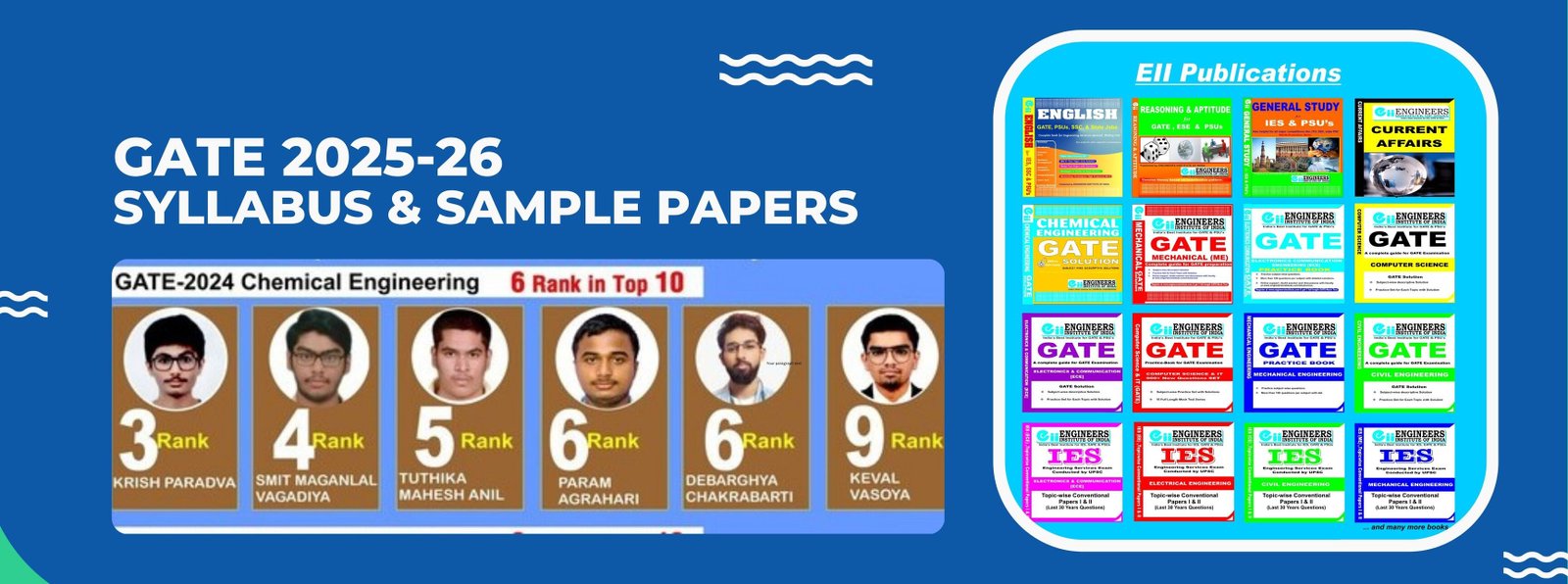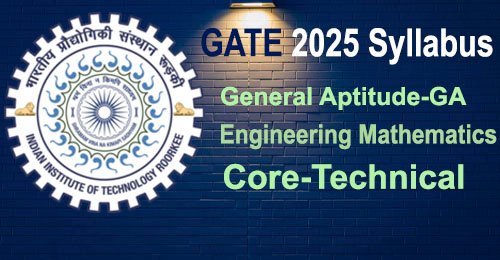GATE 2025 Chemical Engineering-CH Syllabus
Section 1: General Aptitude (GA) Syllabus
(Common for all, 10 Question, 15 Marks)
The General Aptitude section is a common component across all papers of the GATE 2025 examination, constituting 15 marks out of 100 for each subject. The syllabus, available on the official website, aids candidates in preparing more effectively for the GATE 2025 exam. The GATE General Aptitude (GA) Syllabus comprises four key sections:
- 1. Quantitative Aptitude
- 2. Verbal Aptitude
- 3. Analytical Aptitude
- 4. Spatial Aptitude
1. Quantitative Aptitude in the General Aptitude (GA) Syllabus covers the following topics:
- Numerical computation and estimation
- Ratios
- Percentages
- Powers
- Exponents and logarithms
- Permutations and combinations
- Series
- Mensuration and Geometry
- Elementary statistics
- Probability
2. Verbal Aptitude in General Aptitude (GA) Syllabus includes the following topics:
| Basic English Grammar | Basic Vocabulary |
|---|---|
| Tenses | Words |
| Articles | Idioms and phrases |
| Prepositions | |
| Conjunctions | |
| Adjectives | |
| Verb-Noun agreement |
3. Analytical Aptitude in the General Aptitude (GA) Syllabus includes the following topics:
- • Logic: deduction and induction
- • Analogy
- • Numerical relations and reasoning
4. Spatial Aptitude in the General Aptitude (GA) Syllabus includes the following topics:
- • Transformation of shapes
- • Translation & Rotation
- • Scaling & Mirroring
- • Assembling & Grouping
- • Cutting & Paper folding pattern
- • Patterns in 2 and 3 dimensions
Section 2: Engineering Mathematics
Linear Algebra: Matrix algebra, Systems of linear equations, Eigen values and eigenvectors.
Calculus: Functions of single variable, Limit, continuity and differentiability, Taylor series, Mean value theorems, Evaluation of definite and improper integrals, Partial derivatives, Total derivative, Maxima and minima, Gradient, Divergence and Curl, Vector identities, Directional derivatives, Line, Surface and Volume integrals, Stokes, Gauss and Green’s theorems.
Differential equations: First order equations (linear and nonlinear), Higher order linear differential equations with constant coefficients, Cauchy’s and Euler’s equations, Initial and boundary value problems, Laplace transforms, Solutions of one-dimensional heat and wave equations and Laplace equation.
Complex variables: Complex number, polar form of complex number, triangle inequality.
Probability and Statistics: Definitions of probability and sampling theorems, Conditional probability, Mean, median, mode and standard deviation, Random variables, Poisson, Normal and Binomial distributions, Linear regression analysis.
Numerical Methods: Numerical solutions of linear and non-linear algebraic equations. Integration by trapezoidal and Simpson’s rule. Single and multi-step methods for numerical solution of differential equations.
Section 3 Core Subjects : Chemical Engineering-CH
Process Calculations
Steady and unsteady state mass and energy balances including multiphase, multi-component, reacting and non-reacting systems. Use of tie components; recycle, bypass and purge calculations; Gibb’s phase rule and degree of freedom analysis.
Thermodynamics
First and Second laws of thermodynamics. Applications of first law to close and open systems. Second law and Entropy. Thermodynamic properties of pure substances: Equation of State and residual properties, properties of mixtures: partial molar properties, fugacity, excess properties and activity coefficients; phase equilibria: predicting VLE of systems; chemical reaction equilibrium.
Fluid Mechanics-FM and Mechanical Operations-MO
Fluid statics,surface tension, Newtonian and non-Newtonian fluids, transport properties, shell-balances including differential form of Bernoulli equation and energy balance, equation of continuity, equation of motion, equation of mechanical energy, Macroscopic friction factors, dimensional analysis and similitude, flow through pipeline systems, velocity profiles, flow meters, pumps and compressors, elementary boundary layer theory, flow past immersed bodies including packed and fluidized beds, Turbulent flow: fluctuating velocity, universal velocity profile and pressure drop.
Fluid Mechanics-FM and Mechanical Operations-MO
Particle size and shape, particle size distribution, size reduction and classification of solid particles; free and hindered settling; centrifuge and cyclones; thickening and classification, filtration, agitation and mixing; conveying of solids.
Mass Transfer-MT
Fick’s laws, molecular diffusion in fluids, mass transfer coefficients, film, penetration and surface renewal theories; momentum, heat and mass transfer analogies; stage-wise and continuous contacting and stage efficiencies; HTU & NTU concepts; design and operation of equipment for distillation, absorption, leaching, liquid-liquid extraction, drying, humidification, dehumidification and adsorption, membrane separations (micro-filtration, ultra-filtration, nano-filtration and reverse osmosis).
Chemical Reaction Engineering-CRE
Theories of reaction rates; kinetics of homogeneous reactions, interpretation of kinetic data, single and multiple reactions in ideal reactors, kinetics of enzyme reactions (Michaelis- Mentenand Monod models), non-ideal reactors; residence time distribution, single parameter model; non-isothermal reactors; kinetics of heterogeneous catalytic reactions; diffusion effects in catalysis; rate and performance equations for catalyst deactivation
Instrumentation and Process Control-IPC/PDC
Measurement of process variables; sensors and transducers; P&ID equipment symbols; process modeling and linearization, transfer functions and dynamic responses of various systems, systems with inverse response, process reaction curve, controller modes (P, PI, and PID); control valves; transducer dynamics; analysis of closed loop systems including stability, frequency response, controller tuning, cascade and feed forward control.
Plant Design and Economics-PDE
Principles of process economics and cost estimation including depreciation and total annualized cost, cost indices, rate of return, payback period, discounted cash flow, optimization in process design and sizing of chemical engineering equipment’s such as heat exchangers and multistage contactors.
Chemical Technology-CT
Inorganic chemical industries (sulfuric acid, phosphoric acid, chlor-alkali industry), fertilizers (Ammonia, Urea, SSP and TSP); natural products industries (Pulp and Paper, Sugar, Oil, and Fats); petroleum refining and petrochemicals; polymerization industries (polyethylene, polypropylene, PVC and polyester synthetic fibers).


